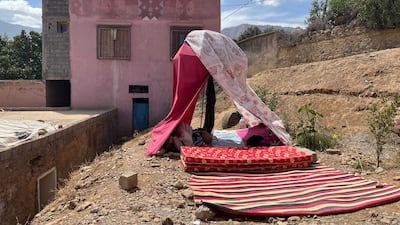In Amizmiz, a small village in Morocco's Atlas Mountains that was destroyed by the earthquake, dozens of vehicles arrived on Thursday with aid from across the country.
The people here, as in other quake-hit villages, are desperately in need of the donations, sent from collection centres in Marrakesh – the nearest big city – about 55 kilometres away.
However, six days after the earthquake, there are many essential items that have not arrived, such as tents, blankets and medicine. And with storms in the forecast, the mood in Amizmiz is one of concern.
“We have been all affected, all of our homes are cracked and we have nowhere to go but to the empty woods here,” said Abdelsalam Askri, standing near his destroyed home.
Mr Askri said the aid so far has included food, water and basic daily necessities, but many important items, including materials to repair their homes, were not available.
“We are very thankful for the food and water, but there are not enough tents … I do not have one myself,” he told The National.
His father had chosen to stay in their damaged house despite the danger. Another tremor shook the region on Thursday.
“My father is disabled and he cannot bear these conditions so he just puts up with the risks and stays there,” Mr Askri said.
Morocco has accepted limited foreign aid and focused more on domestic campaigns run by the government and individuals as well as local NGO initiatives, but the biggest challenge is getting the aid to mountainous areas that can only be reached by helicopter or pack animals.

Many other residents who are camping along the roads of Amizmiz echoed Mr Askri's concerns.
While they are thankful to have survived the earthquake that killed nearly 3,000 people and for the help they are receiving from both from the state and private groups, they cannot help but worry about what lies in store.
Khadija Oussouss and her family are living in a tent across the street from their house because it is no longer habitable.
“Our children now have to live in the dust with no water or soap or medicine,” Ms Oussouss told The National as she held her nine-month-old daughter by the side of the road.
Her son, aged seven, was supposed to go back to school soon, but she worried that might not be possible this year.
“All of the schools have fallen – nothing is standing any more,” Ms Oussouss said.
Many children across El Haouz district are in the same situation, as the majority of school buildings have been damaged or flattened.

Fadoua Trichih, 36, who lives in a another tent nearby with her mother and brother, is worried about the approach of winter.
“I am thankful that I found a place to stay with my family for now, but there are people who have still received nothing, both here and higher in the mountains,” she said.
“The cold is unbearable in our region. We are waiting for authorities to tell us what they will do to protect us from what is coming.”


